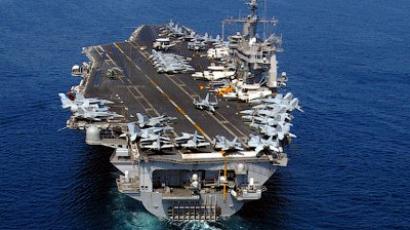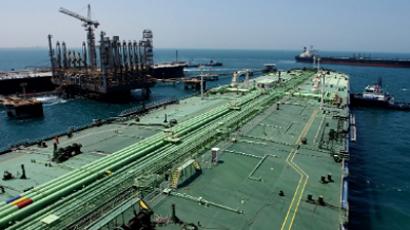Iran ‘recommends’ US stay out of Persian Gulf
Iran has warned the United States it will take action if its fleet returns to the Persian Gulf. Meanwhile, France is pushing European countries to follow the US in freezing Iranian central bank assets and imposing an embargo on oil exports.
Iran’s army chief, General Ataollah Salehi had this message for US naval forces: “We recommend… to the American warship that passed through the Strait of Hormuz and went on to the Gulf of Oman, not to return to the Persian Gulf,” the official IRNA news agency quoted him as saying.Salehi appeared to be referring to the USS John C. Stennis aircraft carrier that left the Persian Gulf through the strategic Strait of Hormuz last Tuesday, as was reported by the Associated Press.The Pentagon issued its own statement in response, saying that the US Naval presence in the Gulf is in “compliance with international law,” and that its fleet is intended to maintain a “constant state of high vigilance” in order to ensure the safe flow of marine commerce.
General Salehi made his statement at the end of a 10-day naval exercise by Iranian forces in the Gulf, during which they tested several modernized long-range surface-to-surface and surface-to-air missiles. It is believed the weapons would be capable of countering the US military presence in the region if required.After the last successful launch on Monday, Iran’s Navy chief, Admiral Habibollah Sayyari, stated that from then on the Strait of Hormuz would be completely in Iran’s control.“The security of the Strait of Hormuz is in our hands,” Sayyari said. “We are controlling the Strait of Hormuz.”
Recently, Tehran has been threatening to block the Strait of Hormuz – one of the world's most important oil routes – if the West slaps more sanctions on its oil exports or risks hostile military act of any kind. Iran’s military, however, denies that threats had been made, saying that they had no direct orders to block the strait.Tensions are growing, with the latest round of sanctions against Iran being introduced on Saturday by the US. The legislation targets Tehran’s financial sector and has already caused the Iranian currency to plunge to a historic low. Iran’s authorities, however, say that the drop in exchange rates is speculative, because it will be several months before the sanctions affect the real economy.
Tehran, which says it aims to develop a complex civilian nuclear industry, recently managed to produce domestically the country’s first nuclear fuel rod. According to the Iranian Nuclear Agency, the first rod has already been inserted into a research reactor. Many believe, though, that Iran’s nuclear program is merely a front for its ambitions to create a nuclear weapon.France is pushing for stricter sanctions against Iran and has urged EU countries to follow the US in freezing Iranian central bank assets and imposing an embargo on oil exports. On Tuesday, French Foreign Minister Alain Juppe said he “has no doubt” that Iran is “pursuing the development of its nuclear arms,” and appealing to the EU to agree sanctions for the Islamic republic by the end of January.
‘Recipe for military disaster’
James Corbett, the editor of the Japan-based news website Corbett Report, told RT that Iran would not threaten to block the Strait of Hormuz unless they felt “the entire existence of their country was under threat.”“I don’t think it’s a really credible threat unless they believe that the military tensions are going to boil over and turn into some sort of confrontation,” he said. “And that’s really due to these crippling sanctions that have been placed. So adding more sanctions to the mix is really just a recipe for military disaster.”Corbett believes that the only outcome that the West should be looking for in the situation should be further talks with Iran.“To do anything else would be to be backing Iran again into that corner in order to increase military tensions,” he said. “We have to understand that when these military tensions are increased to the point where anything can send them over the edge, then we could be seeing some sort of – any sort of – provocation being used as a justification for military confrontation in the region.” Any military action against Iran would mean a much wider regional war rather than a local conflict against Iran’s military, James Corbett believes.“Really, when we talk about military confrontation in Iran, we have to start thinking about Iran’s strategic allies in the area and the possibility of a much larger war that would draw in elements from all over the region,” he said.














